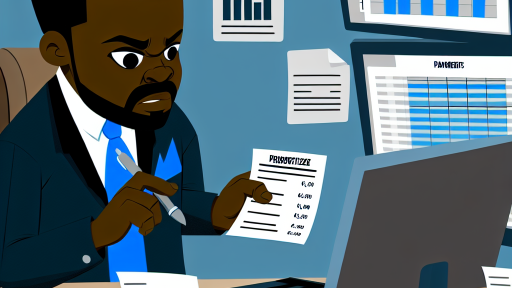Introduction
Managing debt effectively is essential for Nigerians seeking financial stability.
Uncontrolled debt can quickly spiral into serious financial challenges.
High-interest rates and mounting payments can strain your income, limiting your ability to save or invest.
Poor debt management often leads to stress, late payment penalties, and damaged credit scores.
In extreme cases, unchecked debt can result in asset loss or legal consequences.
Understanding how to manage debt is crucial for achieving financial freedom.
By applying proven strategies, you can control your finances and reduce debt stress.
Developing a clear plan and sticking to it ensures that debt doesn’t overrun your budget.
With the right approach, you can gradually reduce your debt and build a more secure financial future.
This blog outlines practical debt management strategies tailored to the Nigerian financial landscape.
Implementing these tips will help you regain control and improve your financial health.
Assessing Your Debt
Evaluate All Debts Owed
Start by listing all the debts you currently owe.
Include credit card balances, personal loans, mortgage payments, and utility bills.
Write down each debt separately to get a complete overview of your financial obligations.
Include debts from informal sources, such as money borrowed from friends or family.
Knowing every debt gives you a clearer picture of your financial situation.
Determine the Total Amount Owed
After listing each debt, calculate the total amount owed.
Add up all your outstanding balances to understand the full extent of your debt.
This figure helps you set realistic repayment goals.
It also highlights the areas where you need to focus more on repayment efforts.
Knowing the total amount owed can be a wake-up call and motivate you to take action.
Understand the Interest Rates for Each Debt
Next, identify the interest rates attached to each debt.
High-interest debts, such as credit card balances, cost you more over time.
Prioritize paying off these high-interest debts first to save money in the long run.
For debts with lower interest rates, you may want to make minimum payments while aggressively tackling costlier obligations.
Understanding the interest rates allows you to strategize effectively and maximize debt repayment.
Categorize Your Debts by Type and Urgency
Organize your debts by categorizing them based on type and urgency.
For instance, separate your debts into categories like credit cards, student loans, and utilities.
Within each category, list the most urgent debts that need immediate attention.
Address debts with strict deadlines or penalties first.
This strategy ensures you don’t face unnecessary late fees or damage to your credit score.
Create a Debt Repayment Strategy Based on Assessment
After assessing your debt, craft a repayment strategy tailored to your financial situation.
Start by allocating more funds towards high-interest debts.
Consider using either the debt snowball or debt avalanche method.
The debt snowball approach involves paying off the smallest balances first, while the debt avalanche targets high-interest debts first.
Choose a method that motivates you and fits your financial goals.
Regularly Review and Update Your Debt Assessment
Debt management requires consistent monitoring.
Regularly review your debts to track progress and adjust your repayment plan as needed.
As you pay off debts, your financial situation will improve.
Reassess your goals periodically to stay on track.
Adjust repayment amounts if you receive extra income or bonuses.
Regular assessment keeps your debt strategy flexible and responsive to changes.
Effective debt management begins with a thorough assessment.
Evaluate all debts, determine total amounts, understand interest rates, and develop a strategic repayment plan.
Taking these steps helps you regain control of your finances and work towards a debt-free future.
Creating a Budget
Develop a comprehensive budget based on income and expenses
Budgeting is a crucial aspect of effective debt management.
By creating a detailed budget, you can gain insight into your financial situation, track your expenses, and identify areas where you can cut back to allocate more funds towards debt repayment.
Importance of Budgeting
- Helps you understand your financial standing.
- Allows you to prioritize debt repayment.
- Enables you to track your spending habits.
When creating a budget, start by listing all your sources of income, including salaries, bonuses, side hustles, or any other cash inflow.
Next, outline all your fixed expenses such as rent, utilities, insurance, and loan payments.
Be sure to include variable expenses like groceries, transportation, entertainment, and other discretionary spending.
Tips for Creating an Effective Budget
- Be realistic about your income and expenses.
- Use budgeting tools or apps to streamline the process.
- Review and adjust your budget regularly to stay on track.
Once you have a clear picture of your financial inflows and outflows, allocate a specific amount towards debt repayment each month.
This can be a fixed amount or a percentage of your income, depending on your financial goals and obligations.
Benefits of Allocating Funds Towards Debt Repayment
- Reduces the overall debt burden over time.
- Helps you save money on interest payments.
- Improves your credit score by demonstrating responsible financial behavior.
By sticking to your budget and consistently allocating funds towards debt repayment, you can make significant progress in reducing your debt load and achieving financial freedom.
Remember, every little bit counts, and small, consistent efforts can lead to big results in the long run.
Read: Understanding Debt Negotiation: A Guide for Nigerians
Your Personalized Financial Plan
Get expert financial advice tailored exclusively to your goals. Receive a custom roadmap in just 1-3 business days.
Get StartedPrioritizing Debts
Identify high-interest debts that should be paid off first
When it comes to managing your debts, one of the key strategies to consider is prioritizing which debts to pay off first.
This can help you save money on interest payments and ultimately free up more funds to tackle your other financial goals.
One of the first steps in prioritizing your debts is to identify which debts have the highest interest rates.
These high-interest debts can end up costing you more in the long run, so it’s essential to tackle them first.
By focusing on paying off high-interest debts, you can save money on interest payments and make progress towards becoming debt-free faster.
This can also help improve your credit score over time, as you demonstrate responsible debt management.
Consider consolidating debts or negotiating lower interest rates
In some cases, you may also want to consider consolidating your debts.
This involves taking out a single loan to pay off multiple debts, typically at a lower interest rate.
Debt consolidation can simplify your monthly payments and lower your overall interest costs.
Another option to consider is negotiating with your creditors for lower interest rates.
Many creditors are willing to work with you to find a repayment plan that is more manageable.
By negotiating lower interest rates, you can reduce the overall amount you owe and pay off your debts more efficiently.
Overall, prioritizing your debts is a crucial step in effective debt management.
By focusing on high-interest debts, consolidating or negotiating lower interest rates, you can take control of your finances and work towards achieving your financial goals.
Read: Unlocking Debt-Free Living: Personal Finance in Nigeria
Cutting Expenses
Identify unnecessary expenses that can be reduced or eliminated
Review Your Expenses
Start by going through your monthly expenses and identifying any unnecessary or frivolous spending.
This could include dining out too frequently, subscribing to services you rarely use, or purchasing items you don’t really need.
By cutting back on these expenses, you can free up more money to put towards paying off your debts.
Create a Budget
Once you’ve identified areas where you can cut back, create a detailed budget outlining your monthly income and expenses.
Allocate a specific amount towards debt repayment, making it a priority in your budget.
Stick to your budget religiously to ensure you meet your financial goals.
Creative ways to save money and allocate more towards debt repayment
Adopt Cost-Saving Habits
Look for ways to save on everyday expenses, such as meal prepping instead of eating out, buying generic brands instead of name brands, or using public transportation instead of driving.
Small changes in your habits can add up to significant savings over time.
Opt for Free or Low-Cost Activities
Instead of spending money on expensive entertainment or recreational activities, look for free or low-cost alternatives.
This could include visiting a local park, hosting a potluck with friends instead of dining out, or taking advantage of community events and festivals.
Reevaluate Your Subscriptions and Memberships
Take a close look at the subscriptions and memberships you currently have and determine if they are truly worth the cost.
Consider canceling any that you don’t regularly use or need. Redirect those funds towards debt repayment instead.
Read: Insight into Personal Finance: Nigerian Debt Management

Increasing Income
Exploring Freelancing or Part-Time Work
One of the most effective ways to increase your income and pay off debts is by exploring freelancing or part-time work.
With the rise of the gig economy, there are countless opportunities to earn money outside of your regular job.
Unlock a Debt-Free Future with Our Unique Strategies
Imagine a life unburdened by debt—a reality we help you visualize and achieve. We offer personalized strategies tailored to your unique situation, guiding you step-by-step toward financial freedom.
Start TodayFreelancing allows you to work on projects on a contract basis, giving you the flexibility to choose when and where you work.
Popular freelancing platforms like Upwork, Fiverr, and Freelancer offer a wide range of opportunities in various industries.
On the other hand, taking up part-time work can provide a steady source of extra income.
Whether it’s working at a retail store on weekends or driving for a ride-sharing service in the evenings, part-time work can help you boost your earnings and make a dent in your debts.
Utilizing Skills or Talents for Extra Income
If you have a specific skill or talent, such as writing, graphic design, photography, or coding, you can use it to generate extra revenue.
Consider offering your services on freelance platforms or reaching out to potential clients directly.
For example, if you’re a talented writer, you could freelance for content creation agencies, create a blog and monetize it through ads or affiliate marketing, or offer copywriting services to businesses.
Similarly, if you have a knack for design, you could create custom graphics or logos for clients.
By utilizing your skills or talents to generate extra income, you can not only pay off your debts faster but also potentially turn your side hustle into a full-time business.
It’s a win-win situation that can help you achieve financial freedom and stability.
Read: Mastering Debt Management: Essential Tips for Nigerians
Implementing a Debt Repayment Plan
Debt Repayment Strategies
When it comes to managing debt, one of the key steps is implementing a debt repayment plan.
By choosing a strategy that works best for you, you can take control of your finances and work towards becoming debt-free.
Snowball Method
The snowball method involves paying off your debts from smallest to largest, regardless of interest rates.
Start by making minimum payments on all debts except the smallest one.
Once the smallest debt is paid off, use the money you were putting towards it to pay off the next smallest debt, and so on.
This method can help boost your motivation as you see debts being paid off one by one.
Avalanche Method
The avalanche method, on the other hand, involves paying off debts with the highest interest rates first.
While it may take longer to see results compared to the snowball method, it can save you money in the long run by reducing the amount of interest you pay.
Make minimum payments on all debts, but allocate extra funds towards the debt with the highest interest rate.
Once that debt is paid off, move on to the next highest, and so on.
Setting Goals and Timelines
Once you have chosen a debt repayment strategy, it’s important to establish specific goals and timelines for paying off each debt.
This will help keep you accountable and on track towards achieving financial freedom.
Assess Your Debts
Start by making a list of all your debts, including the total amount owed, interest rates, and minimum monthly payments.
This will give you a clear picture of your financial obligations and help you prioritize which debts to tackle first.
Determine Monthly Payment
Calculate how much you can realistically afford to put towards debt repayment each month.
Make sure to allocate more funds towards high-interest debts to minimize interest costs over time.
Set Specific Goals
Based on your financial situation, set specific goals for paying off each debt.
Whether it’s paying off a certain amount by a certain date or completely eliminating a debt within a specific timeframe, having clear goals will keep you motivated and focused.
Create a Timeline
Map out a timeline for each debt repayment goal, breaking down the total amount owed into manageable monthly payments.
By setting realistic timelines, you can track your progress and make adjustments as needed to stay on track.
Unlock Untapped Nigerian Wealth with Our Expert Advice
Imagine accessing investment opportunities others overlook—stocks, bonds, real estate, small businesses tailored to you. We offer personalized advice you won't find elsewhere, guiding you to financial success.
Unlock WealthBy implementing a debt repayment plan, choosing a suitable strategy, and setting specific goals and timelines, Nigerians can take control of their finances and work towards a debt-free future.
Seeking Professional Help
When facing overwhelming debt, it can be beneficial to seek professional help from experts who can provide personalized advice and guidance.
Here are some key points to consider when seeking professional assistance:
Consulting with a Financial Advisor or Credit Counselor
One of the first steps you can take is to consult with a financial advisor or credit counselor.
These professionals can provide you with valuable insights into your financial situation and help you create a personalized debt management plan.
During your consultation, be sure to provide detailed information about your income, expenses, debts, and financial goals.
This will enable the advisor or counselor to better understand your situation and recommend appropriate strategies for managing your debt.
Financial advisors can also help you explore options for increasing your income, reducing expenses, and improving your overall financial health.
They can offer advice on budgeting, saving, investing, and other financial matters that can help you achieve your long-term financial goals.
Exploring Debt Management Programs or Services
If you’re struggling to manage your debt on your own, it may be helpful to explore debt management programs or services that can provide specialized assistance.
These programs can help negotiate with creditors on your behalf and create a structured repayment plan that fits your financial situation.
Debt management programs typically involve working with a credit counseling agency that can help you consolidate your debts, negotiate lower interest rates, and create a manageable repayment schedule.
These programs can be especially beneficial if you have multiple debts with high interest rates and are finding it difficult to keep up with payments.
Before enrolling in a debt management program, be sure to research different agencies and programs to find one that is reputable and trustworthy.
Look for programs that are accredited by organizations such as the National Foundation for Credit Counseling (NFCC) or the Financial Counseling Association of America (FCAA).
Overall, seeking professional help for managing your debt can provide you with valuable support and resources to help you regain control of your finances.
By consulting with financial advisors or credit counselors and exploring debt management programs, you can take proactive steps towards achieving financial stability and peace of mind.
Monitoring Progress
Monitoring progress is a crucial aspect of debt management for Nigerians.
By keeping a close eye on your debt repayment plan, you can ensure that you are on track to becoming debt-free.
Here are some strategies to help you effectively monitor your progress:
Set Clear Goals
Before you can effectively monitor your progress, you need to have clear, achievable goals in place.
Define how much debt you want to pay off and by when.
Having concrete goals will give you a roadmap to follow and help you stay focused on your journey.
Use a Budgeting Tool
Consider using a budgeting tool or app to help you track your payments and progress.
These tools can help you stay organized, visualize your progress, and identify areas where you may need to make adjustments.
Check in Regularly
Make it a habit to check in on your debt repayment progress regularly.
Set aside time each week or month to review your payments, balances, and overall progress.
This will help you stay accountable and make any necessary changes to your plan.
Celebrate Milestones
As you reach certain milestones in your debt repayment journey, be sure to celebrate your progress.
Whether it’s paying off a specific debt or reaching a certain percentage of your overall goal, take the time to acknowledge your achievements.
Celebrating these victories can help you stay motivated and focused on the bigger picture.
Stay Motivated
Debt repayment can be a long and challenging process, so it’s important to find ways to stay motivated along the way.
Consider creating a vision board or keeping a journal to remind yourself of why you are working towards becoming debt-free.
Surround yourself with positive influences and support to help you stay on track.
By consistently monitoring your progress, celebrating milestones, and staying motivated, you can successfully manage your debt as a Nigerian and work towards a more financially secure future.
Conclusion
Effective debt management requires commitment and strategy.
Prioritize paying off high-interest debts first to reduce financial strain.
Create and stick to a budget to control spending.
Explore debt consolidation if managing multiple debts becomes challenging.
Regularly review your financial situation to stay on track.
Taking control of your finances empowers you to break free from debt.
Make debt repayment a priority and avoid taking on unnecessary new debt.
Remember, becoming debt-free is a journey, not a sprint.
Celebrate small victories along the way to stay motivated.
By applying these proven strategies, you can achieve financial freedom and build a more secure future.
Becoming debt-free requires patience, but the financial freedom it offers is worth the effort.
Implement these strategies and make informed financial decisions.
Your journey towards a debt-free future starts today.




